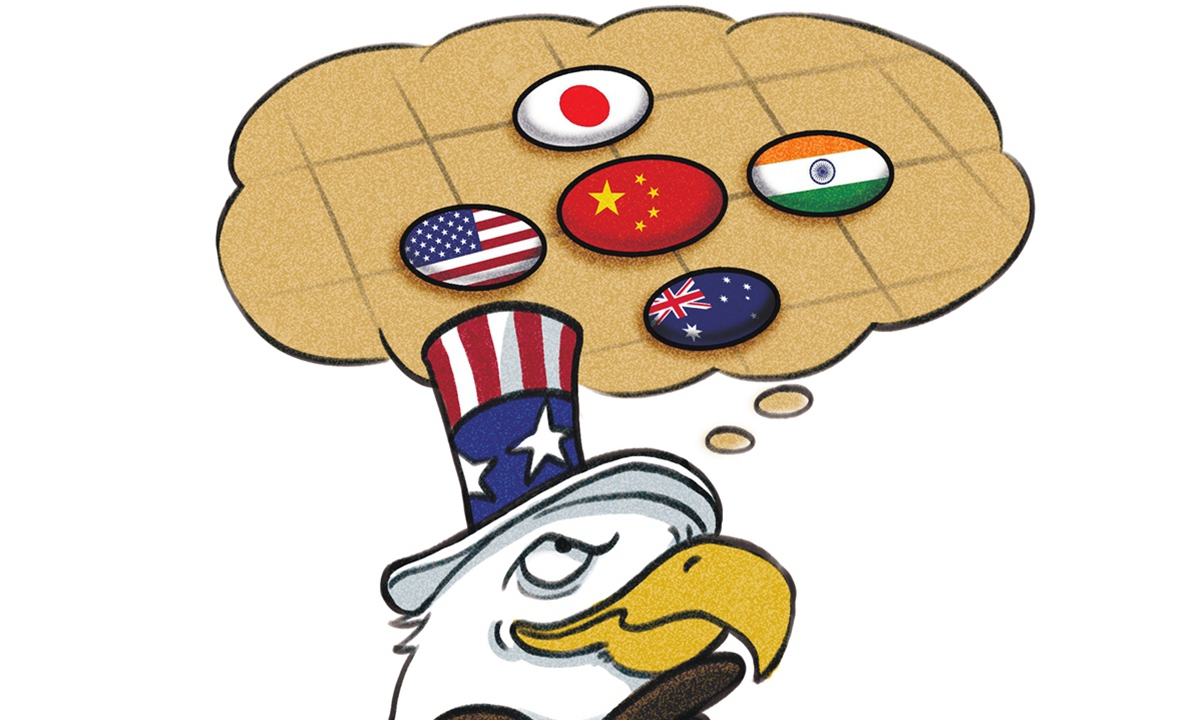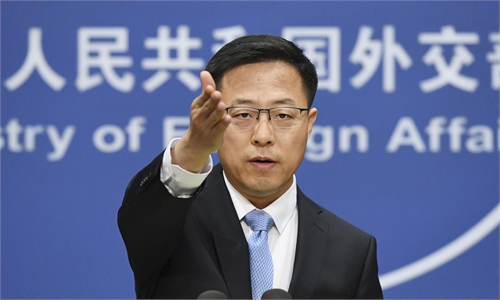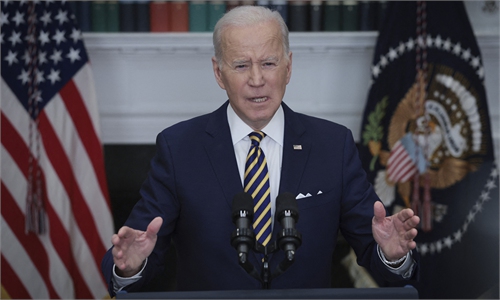
Quad. Illustration: Liu Rui/Global Times
US President Joe Biden will visit South Korea and Japan from May 20-24. This will be his first trip to Asia since he took office. The visit was under planning from the beginning of the year with constant official briefings and media reports about it. The agenda and main points of it were already clearly outlined. Various signs have shown that the trip is a foretold provocative one targeting China. If the US plays such a role, it will inevitably trigger concerns in the Asia-Pacific region.Rahm Emanuel, US ambassador to Japan, said blatantly that Biden's trip is "a wake-up call to China that America is the permanent Pacific presence and power." Recently, US officials and media have been openly talking about how Biden will coordinate with his South Korean and Japanese counterparts to contain or exclude China. Against such a backdrop, how should the Chinese people view the US' reiterated commitments that it does not seek a new Cold War with China; it does not aim to change China's system; the revitalization of its alliances is not targeted at China; the US does not support "Taiwan independence"; and it has no intention to seek a conflict with China? How can this not alarm all those people in the Asia-Pacific region who cherish peace and development?
It needs to be pointed out that this is an extremely abnormal scenario in international exchanges after the end of the Cold War: The leader of a major power openly instigates provocations in neighboring countries of another major power and designs a mechanism to classify camps. The move is aimed at undermining existing bilateral and multilateral mechanisms with cooperation and development as keynotes. Since when has this kind of geopolitical diplomacy with a strong Cold War tinge been taken for granted by public opinion in the US and other Western countries?
Chinese State Councilor and Foreign Minister Wang Yi held on Wednesday a virtual meeting with Japanese Foreign Minister Yoshimasa Hayashi. Wang noted, "What makes people pay attention and be vigilant is that even before the US leader embarks on his trip, the viewpoint that Japan and the United States join hands to confront China was already rampant, creating a foul atmosphere."
Washington has made use of its international discourse power in an attempt to rationalize and justify its containment campaign against China and even confrontation with China. It tries to shape an idea by making people accustomed to it. This tendency of public opinion in the US and the West has done great damage to regional and world peace and stability.
In addition to playing the previous cards of "security" and "military," Biden will also bring the anti-China "economic" card this time. US Commerce Secretary Gina Raimondo revealed on Tuesday that Biden will announce the launch of the Indo-Pacific Economic Framework during his visit to Japan. The economic initiative will focus on building key areas in economy and supply chain in the decades to come. This is not because the US really wants to promote economic prosperity in the Asia-Pacific region, rather it is an attempt to rope in other countries to "decouple" from China, and then create a "small circle" that excludes China in terms of the economy.
But the intent is one thing, the actual effect is another. Not to mention that Japan, South Korea and other countries in the region are deeply integrated with Chinese economy, and it is difficult to "decouple." Whether the "Indo-Pacific Economic Framework" Washington has articulated can be fulfilled remains a big question. The US is approaching the midterm elections and the 2024 presidential election is only two years away, who can ensure that what happened to the Trans-Pacific Partnership (TPP) will not repeat itself? Who doesn't have doubts about American-style abandonment of treaties? Who can guarantee that the US will not pillage its allies during a recession?
The consequences of the US constantly stirring up regional tensions and creating world divisions are very clear. There were the examples of Iraq, Syria, and Afghanistan, and then there is the Russia-Ukraine conflict. Now, the US is targeting the Asia-Pacific region, viewing it as a geopolitical chess game and turning China's neighboring countries into pawns it can manipulate at will. However, the Cold War alliance and geopolitical confrontation have long been unpopular, and any initiative to serve this goal is short-lived. We believe that most Asia-Pacific countries are sober-minded. It's not feasible to scare China by borrowing the power of the US, and it is even less worthwhile to sacrifice themselves for the interests of the US.
President Biden has not yet set off. Although US media has made a lot of revelations intentionally or unintentionally, there are still different possibilities. The US claims itself an Indo-Pacific power, it should take care of the Asia-Pacific, a land of cooperation and development, instead of making it a "battlefield" for zero-sum games. We hope that Biden can finally use his words and deeds to prove that public opinion was wrong. Otherwise, the visit will go down in history as "a disappointing, regrettable and destructive one."



